Should I give my cat fish oil?
(*This post contains affiliate links and I will be compensated if you make a purchase after clicking on my links.)
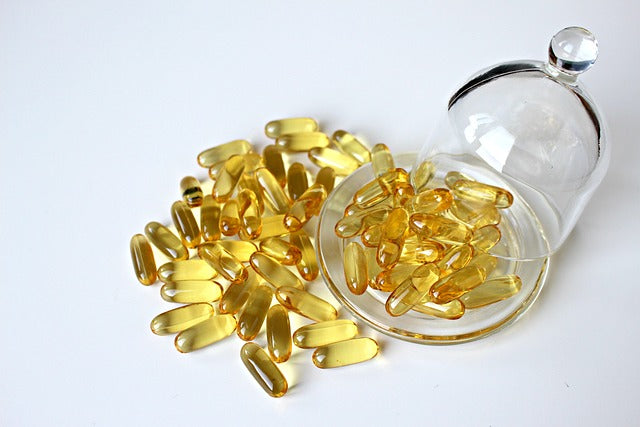
When my doctor suggested that I start taking fish oil for my health, I found it easy to get good information about the health benefits of fish oil in humans.
But what about my pets? If people benefit from taking fish oil, could fish oil be good for cats, too?
The short answer is yes, fish oil can be very beneficial to a cat’s health, although there isn’t nearly enough scientific research about this topic as any of us cat lovers would like. I’ll share what we know about fish oil and cats in this post.
Before starting any supplement regimen with your precious kitties, however, check with your veterinarian. Cats with certain health conditions shouldn’t take fish oil, and cats on certain medications should stay away from fish oil, too. Even good things aren’t good for every cat.
For those who want to cut to the chase, here’s the TL;DR. This is my personal list of recommended fish oils and algae oils for cats.
My #1 recommended fish oil is: Nordic Naturals Omega-3 Cat
Other recommend fish oils include:
Grizzly Omega Health for Dogs & Cats
Deley Naturals Fish Oil for Cats
Algae oils for cats:
Fera Pets Plant-based Omega 3s
What is fish oil?
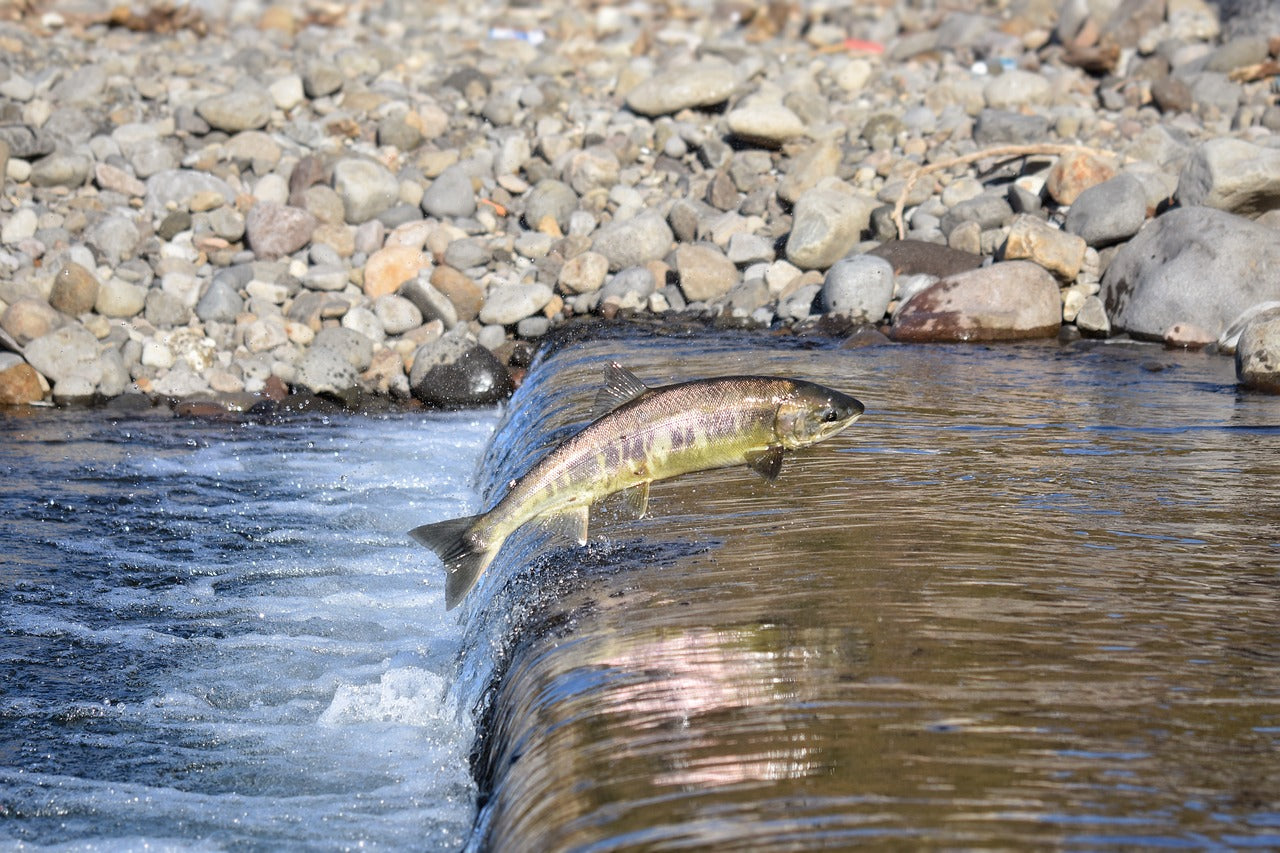
Fish oil is liquid fat that is squeezed, or in some other way separated, from the body tissues of oily fish.
This oil is a type of polyunsaturated fat that contains nutrients called omega-3 fatty acids.
Polyunsaturated fats are generally considered to be healthy fats.[1]
What are omega-3 fatty acids?
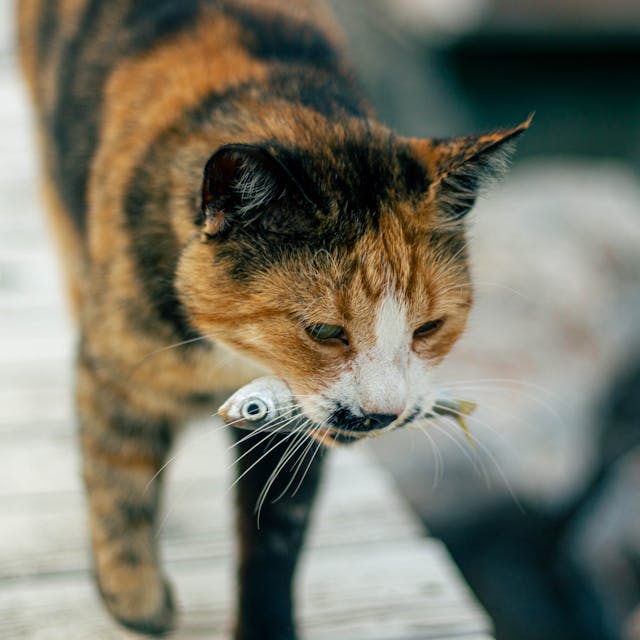
Omega-3 fatty acids are essential nutrients for both cats and humans.
“Essential” just means that these nutrients are necessary for health, but that our bodies can’t manufacture them. Cats and humans alike need to get fatty acids from the food we eat.
There are actually 11 different kinds of omega-3 fatty acids that occur in food,[2] but two of those fatty acids are especially important.
The really important ones are called docosahexaenoic acid and eicosapentaenoic acid, or DHA and EPA for short. DHA and EPA are abundant in fish oil.
These particular omega-3s are found in seafood, but they’re also found in meat and dairy from grass-fed animals, and eggs from chickens who live outdoors on pasture.[3]
They're also found in some algae, but I’ll get to that later.
Why are they called omega-3s?

The name “omega-3” refers to the chemical structure of the fatty acid, which is a long chain of carbon and hydrogen atoms that are bonded together.
“Omega” is a Greek letter that means “end.”[4] There’s a double bond after the third carbon atom from the end of the chain. The “3” in omega-3 is referring to that third carbon atom.[5]
There are other types of fatty acids called omega-6s, and these have their double bond after the sixth carbon atom from the end.
What about omega-3s that come from plants?

It’s true that some plants produce omega-3 fatty acids. There are omega-3s in nuts, seeds, and vegetable oils.
But the kind of fatty acid in plants is alpha-linoleic acid (ALA for short), not DHA or EPA.
ALA is not an essential nutrient. It’s considered “conditionally essential,” because the body has to convert ALA to DHA and EPA.[6]
The human body, unfortunately, doesn’t do a very good job of converting. Only about 1% of ALA gets converted.[7]
But cats can’t convert ALA to DHA and EPA at all.[8] ALA is basically useless to cats.
What kind of fish is used to make fish oil?
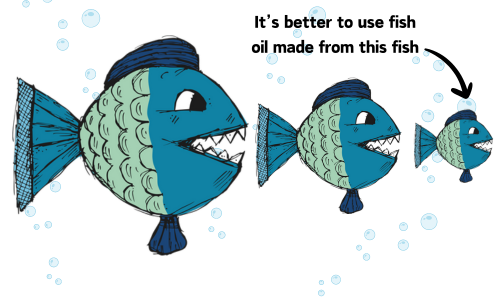
Fish oil products can come from a wide variety of fish and shellfish, including:
- Salmon
- Mackerel
- Trout
- Eel
- Herring
- Tuna
- Menhaden
- Anchovy
- Sardines
- Shrimp
- Mussels
- Oysters
- Crabs[9][10][11][12][13]
There are two main benefits to using fish oil made from smaller fish, like sardines, mackerel, and anchovies.
- Fishing smaller fish is more environmentally sustainable.
- Smaller fish contain fewer toxins, such as heavy metals, PCBs, and dioxins, than big fish, because small fish are lower on the food chain.[14] Bigger fish, which live longer and eat more, tend to accumulate the toxins consumed by all of the other fish they’ve eaten over the course of their lives.
How is fish oil made?
There are various methods of extracting oil from fish, and none of them are pretty. The goal is to separate the solids, water, and oil. The solids are used to create fishmeal, which is used in animal feed.
One of the most common methods of extracting fish oil on an industrial scale is “wet pressing.” The killed fish are cooked, and force is used to press the oils out from the tissues of the fish.[15]
But it’s not the only way to extract fish oil. Solvents, including chloroform, methanol, and petroleum ether can be used. Enzymes and acids, and something called “supercritical fluid extraction,” which uses carbon dioxide to separate the oil from the flesh, can be used. There are methods that use microwave energy and ultrasound.
Each of the methods has its advantages and disadvantages. Heat and pressure, for example, can degrade the fish oil. Solvents can leave residues behind in the final product.[16]
After the fish oil is separated from the flesh, it needs to be refined to make it safe for cat (or human) consumption. The refining process could include de-gumming, neutralizing, bleaching, or deodorizing to produce a final product.[17]
Because there are so many opportunities for fish oil to degrade during manufacturing, or for toxins and impurities to be present in the final product, not all fish oil is created equal.
We will discuss this topic in more detail below.
Why do cats need omega-3 fatty acids?
Fatty acids are critical to many bodily functions, from muscle activity, to cell growth, wound healing, and immune response.
Fatty acids provide energy, help absorb vitamins, and control inflammation. They’re essential for maintaining the skin’s structure and moisture.[18]
Will I be able to tell if my cat isn’t getting enough fatty acids?
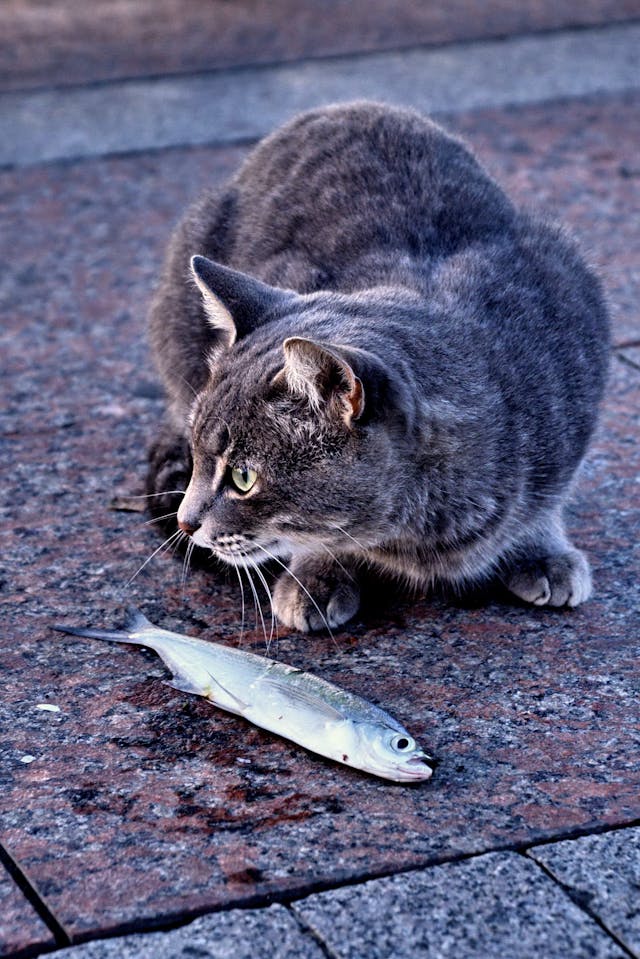
Cats who are not getting enough fatty acids in their diets will begin to show signs, including:
- A dull, dry coat
- Scaly skin
- Irritated, red patches of skin
- Scratching, rubbing, and itching
The longer a cat goes without sufficient fatty acids in her diet, the worse her symptoms will become. In cats with a severe fatty-acid deficiency, you’ll see:
- Hair loss
- Painful rashes
- Greasy skin, especially on the ears and between the toes
- A bacterial infection in the upper layers of skin called “secondary pyoderma”[19]
How does fish oil help improve cat health?

Adding fish oil to the diet can be helpful to health even if the human or animal is not showing signs of being deficient in fatty acids.
There’s actually a lot of scientific research around the benefits of fish oil to humans and dogs.
Although there are fewer studies in cats, science suggests that there can be benefits to adding fish oil to most cats’ diets.[20]
DHA and EPA are anti-inflammatories and many of the potential uses of fish oil for cats appear to be in inflammatory diseases, including skin allergies, dermatitis, arthritis, kidney disease, heart disease, inflammatory bowel disease, diabetes, epilepsy, and some types of cancer.[21]
Potential health benefits of fish oil to cats include:
Heart
Fish oil can prevent a cat from developing an irregular heart rhythm. It seems to prevent blood clots from forming in cats with heart disease.[22] Fish oil also appears to help lower a cat’s blood triglyceride levels and blood pressure.[23]
Cognitive development and function

Fish oil has been shown to support brain development in young animals. It has also been shown to help decrease the signs of cognitive dysfunction in middle-aged cats.[24]
A 2013 study showed that middle-aged cats performed better on three out of four cognitive tests when their diets were supplemented with a blend of nutrients, including fish oil, than cats in a control group.[25]
Allergies
One study showed that 50% of cats with allergic itchy skin showed improvement when essential fatty acids were added to their diets.[26]
Fish oil may reduce itching and improve dry flaky skin in cats by decreasing the production of cytokines, which stimulate inflammation.[27]
Kidney disease
In a study of 146 cats with kidney disease, those fed diets supplemented with omega-3s lived a median of 17 months, compared to only seven months for cats who did not receive the supplements.[28]
Fish oil may lower blood pressure, decrease protein loss in urine, and reduce the production of inflammatory substances that irritate the kidneys.[29]
(Read about chronic kidney disease in this post.)
Arthritis
Studies show that 22-72% of cats over age six have some form of arthritis.[30]
Fatty acids can help make arthritic cats more comfortable by decreasing the production of prostaglandins that stimulate inflammation in joints.[31] Fatty acids may also block the enzymes that break down the cartilage in joints.[32]
A 20-week study of 21 cats with arthritis, the cats who got fish oil were more active, less stiff, walked up and down stairs more, jumped higher, and interacted with their guardians more than the cats who were given fishy-smelling corn oil.[33][34]
Vision

Fish oil has been shown to help maintain eye health in adult cats, and support eye development in kittens.[35]
Cancer
Fish oil is currently being researched for treatment of cancer in humans and animals. Current research is not definitive, but suggests there might be a benefit.[36] More study is needed.
Immune system
A study involving 43 healthy cats showed the salmon oil had a positive effect on their immune systems, making these cats more likely to be able to fight infection and disease.[37]
How to choose a fish oil to give your cat
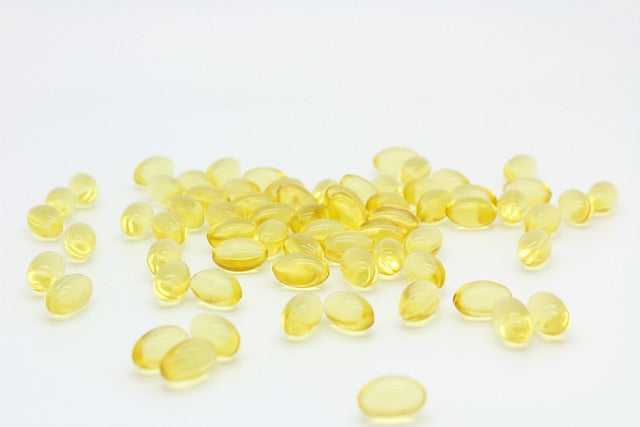
Fish oil is a dietary supplement, just like vitamins, minerals, botanicals, enzymes, and probiotics.
Supplements are usually sold over-the-counter. In other words, you don’t need a prescription to purchase most supplements.
The fact that you can buy a supplement without a prescription doesn’t mean that supplements can’t have powerful, biological effects. It only means (in the U.S.) that they are not regulated by the FDA like prescription medications.
Without regulation, there can be significant variation between brands. A manufacturer can sell a supplement without having to prove the effectiveness or safety of the product. You, as a consumer, will get no guarantee that the ingredients on the label are accurate.[38]
A 2013 study looked at the top-selling fish oil supplements for humans and found that more than half of the products did not contain the amount of EPA and DHA that the manufacturers claimed. A quarter of the products were rancid.[39]
What should you look for in a fish-oil product for your cat?
Wild, not farmed fish

Wild fish eat algae and plankton, which are the primary source of omega-3s.[40]
Farmed fish are fed pelleted fish food, which may be made with fish trimmings, corn, chicken fat, soybeans, and other fillers. They may be given hormones or antibiotics to help them grow quickly and to keep disease under control, which is more prevalent in farmed fish.
Both wild and farmed fish are exposed to mercury and other contaminants.[41]
Triglyceride form
There are at least three different forms of fish oil: triglyceride, ethyl ester (EE), and re-esterified triglyceride (rTG). The triglyceride form is the natural form, while the other two forms are synthesized through a chemical process.
The synthetic forms are usually less expensive, and may appear to have more DHAs and EPAs than the natural form. But they are less stable and appear to be more poorly absorbed by the body.[42][43]
Third-party tested
Because there is no government oversight of fish oil production, any product you purchase should be independently tested for potency and purity.
Reputable fish-oil manufacturers will make Certificates of Analysis, conducted by a third party, for the exact batch of fish oil that you have purchased, available to you.
Molecularly distilled


Molecular distilling helps purify the fish oil. Contaminants, like mercury, PCBs, and dioxins are removed. What remains is concentrated fish oil.[44]
The disadvantage of molecularly distilled fish oil is that it can be more expensive than fish oil that has not been purified.
Small serving size
Cats are well…cats. They can be finicky. You want a fish oil that is easy to incorporate into the diet.
Look for a product with a serving size of one teaspoon, one capsule, or one to two treats per day.[45]
Some recommended fish oil products for cats
This is not an exhaustive list, but the following are fish oil products for cats from reputable manufacturers:
My #1 recommended fish oil is:
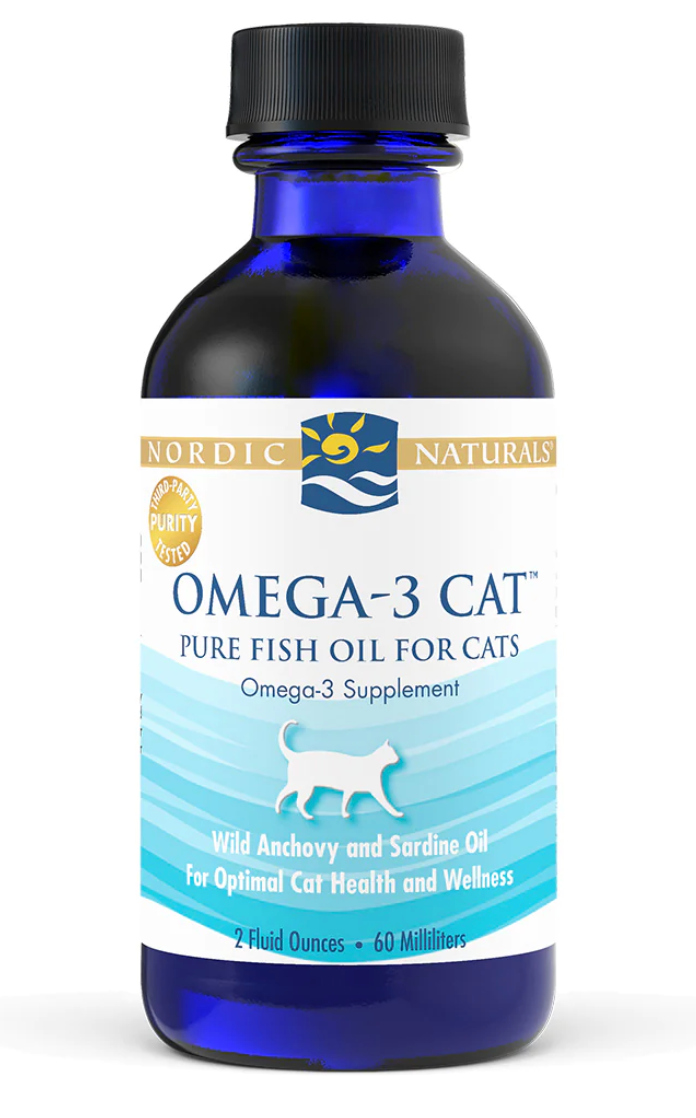
Other recommend fish oils include:
Deley Naturals Fish Oil for Cats
Grizzly Omega Health for Dogs & Cats
Does fish oil have any side effects?
Fish oil is considered to be a very safe supplement. Still, some cats may experience mild nausea or diarrhea when they first start taking it. Start with a lower dose and work your way up slowly.
In high doses, fish oil can cause:
- Diarrhea
- Vomiting
- Delayed wound healing
- Sleepiness
- Fish odor to breath or skin
- Increased itchiness
- Oily coat
- Skin flakes[46]
Be sure you’re following the dosing instructions on the bottle, or those given by your veterinarian. But if your cat is showing any of the above signs, discontinue use of the fish oil.
More serious side effects from fish oil can occur, but rarely. These would include:
- Changes in the blood’s ability to clot
- Pancreatitis (inflammation of the pancreas)
- Abnormal bleeding or bruising
- Delayed wound healing
- Heavy metal toxicity (which will appear as a loss of appetite, incoordination, or seizures)[47][48]
Does fish oil interact with any medications?

Yes.
Vitamins, supplements, and herbal medicines all have the potential to interact with each other and prescription and over-the-counter medicines. Talk to your vet before adding fish oil, or any other supplement to your cat’s diet.
In general: don’t give fish oil to cats who are also on anti-coagulant medications because fish oil can amplify the anti-clotting effects of the drug.
Don’t give fish oil to cats taking the chemotherapy drug doxorubicin, or non-steroidal anti-inflammatory drugs (NSAIDs).
Are there cats who should never have fish oil?
The decision to give your cat fish oil is one that you should make with your vet.
In general, fish oil should be used cautiously in cats who are pregnant or nursing, in cats with diabetes, diarrhea, or a history of pancreatitis. It should probably not be given to cats with blood-clotting disorders.
How do you give fish oil to a cat?
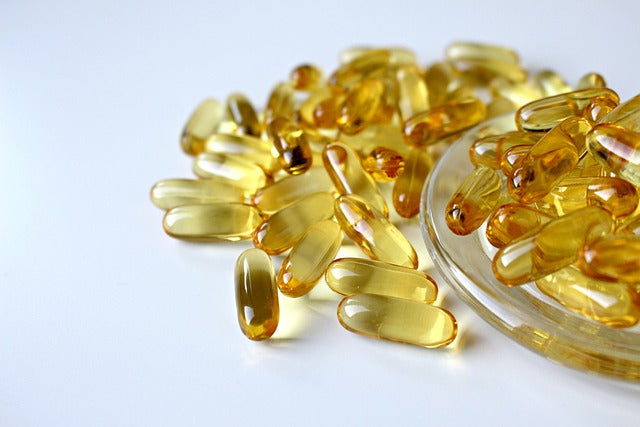
Fish oil comes in liquid form or in a capsule.
The liquid format typically comes in a bottle with a pump. The label will tell you how many pumps to give your cat.
Most cats won’t readily swallow a capsule, so you can cut off the tip of the capsule and squeeze the contents into your cat’s bowl or onto his food.
Fish oil does not need to be given with food, but can be given with food, especially in cats with sensitive stomachs.
Note that you might not see the full effect that fish oil will have on your cat for a few weeks.[49]
How should fish oil be stored?
Fish oil, especially unopened bottles, should be stored in a cool, dry place, protected from sunlight, which could cause it to oxidize and become rancid.[50]
Some products require refrigeration once they have been opened. Read the label of the product you’ve purchased for instructions.
How much fish oil is safe to give to cats?
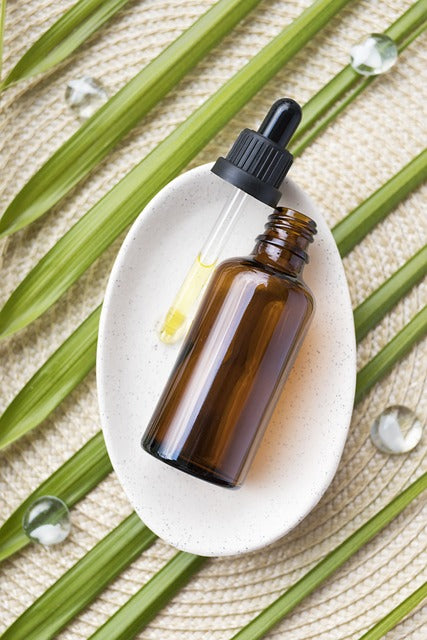
We don’t know the maximum safe dose in cats. There is considerable research on fish oil in dogs, but fewer studies in cats.[51]
Follow the recommendations on the bottle, or from your vet. While a little fish oil is good, too much might not be, so measure what you give to your cat carefully.
What if I miss a dose of fish oil?
You can give your cat her fish oil as soon as you remember, so long as it’s not too close to the time of her next dose.
If it is close to the time for her next dose, just wait. Don’t give your cat two doses at once.
What is the one fish oil I should never give my cat?
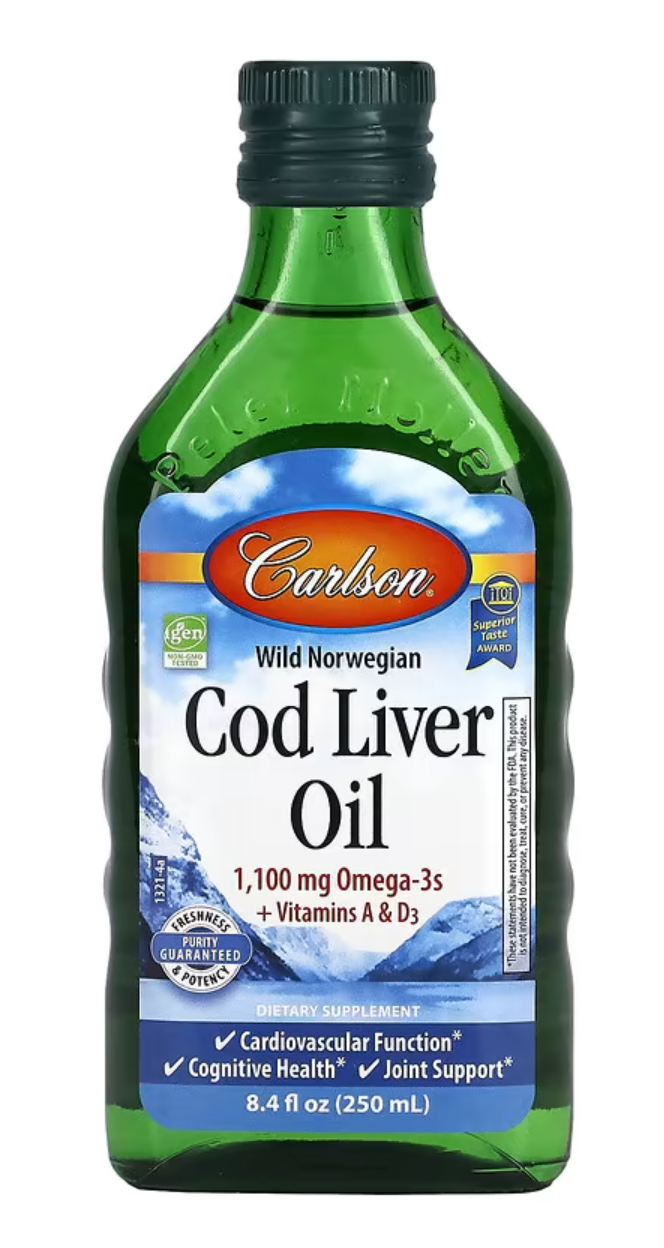
Don’t give your cat cod liver oil, or any fish oil with added vitamin A or D.
Cod liver oil is naturally rich in vitamin A, and cats absorb vitamin A very readily. Too much vitamin A can be extremely toxic to cats, leading to vomiting, drowsiness, irritability, and peeling skin.
Over time, cats lose weight, develop severe skin problems, become constipated, and develop too much bone. Movement becomes painful and limited.[52]
It’s also possible for a cat to get too much vitamin D. Vitamin D poisoning can cause an increased respiratory rate, difficulty breathing, bleeding in the intestines, slow heart rate, abnormal heart rhythms, mineralization of body tissues, and even death.[53]
What about flaxseed oil, canola oil and other alternatives to fish oil for cats?
Seed oils, including flaxseed and canola oil, are poor sources of EPA and DHA. Like most plant-based sources of fatty acids, flax products have high concentrations of ALA which needs to be converted to EPA and DHA by the body.
Cats have virtually no ability to convert ALA to DHA or EPA.[54]
Algae oil: the one excellent alternative to fish oil for cats

Algae are organisms that live in water. They’re not plants, although, like plants, many algae are green because they contain chlorophyll. Algae also perform photosynthesis the way plants do, turning sunlight and carbon dioxide into energy.
Algae is actually the primary source for the omega-3s in fish oil. Fish do not actually manufacture their own EPA and DHA. They get omega-3s from the microalgae and plankton (tiny organisms that eat microalgae) that they eat.
Certain algae produce high levels of EPA and DHA, and some manufacturers are making fish-oil alternatives from these species of algae grown in laboratories on land.
There are some benefits of algae oil versus fish oil:
- Algae oil is more sustainable. Algae is a renewable resource. Fish oil supplements can contribute to overfishing, pollution of the ocean, and destruction of marine habitats.
- Algae oil is cleaner because it’s grown in a controlled environment, protected from environmental pollutants. Fish, even farmed fish, are exposed to water pollution, including dangerous heavy metals like mercury, and microplastics.
Is algae oil safe for cats?

Algae oil appears to be a safe and healthful alternative to fish oil for cats.
A 2020 study of cats who were given algae oil prior to becoming pregnant, and then followed through their pregnancy and lactation, and their kittens followed for 32 weeks of life, showed that algae oil is safe.
This study also showed that the omega-3s in algae oil were well absorbed by cats.[55]
But as always, if you are thinking of supplementing your cat’s diet with algae oil, check with your vet first.
Here are some algae oils that are manufactured specifically for dogs and cats:
Fera Pets Plant-based Omega 3s
Can I give my cat fish oil meant for humans?
There may be two potential questions here: one about pet fish oils that call themselves “human-grade,” and the other about fish oils intended for humans.
Human-grade fish oil

Some fish oils that are manufactured for pets claim to be “human-grade.”
The Association of American Feed Control Officials (AAFCO) defines human-grade to mean that every ingredient in a pet food or supplement product be stored, handled, processed, and transported the way foods designed to be eaten by humans would be.
Human-grade fish oil is fish oil that is made in a manufacturing plant that is licensed to produce human foods, and handled the way human food is handled.[56]
This does not mean, necessarily, that the human-grade fish oil is of higher quality, or is healthier. It only means that it was made in a human-food manufacturing facility, versus a pet-food manufacturing facility.
There are some human-food plants that barely meet the minimum standards and pet-food plants that have very high standards.
Fish oil for humans
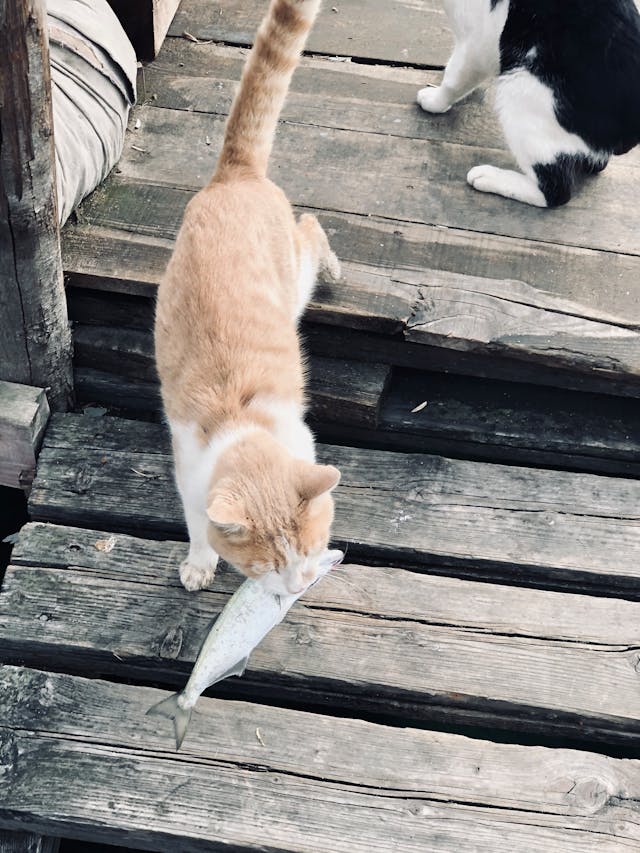
Stick with fish-oil products designed for cats.
Fish oil intended for humans has human dosing on the label, so it may be difficult to know exactly how much of these kinds of products you should be giving a cat.
Also, human fish oil products could contain flavorings, fillers, ingredients, or pill coatings that are poisonous to cats.
Does fish oil help cats who are constipated?
No.
Constipation can be the result of a number of different conditions or problems, including dehydration, litter-box issues, bowel obstructions, and certain diseases, and fish oil doesn’t get to the root of any of these problems, or even provide temporary relief.
Constipation is not something to be taken lightly in cats. It can become serious very quickly. Read this post on cats and constipation for more information.
Does fish oil help prevent hairballs in cats?
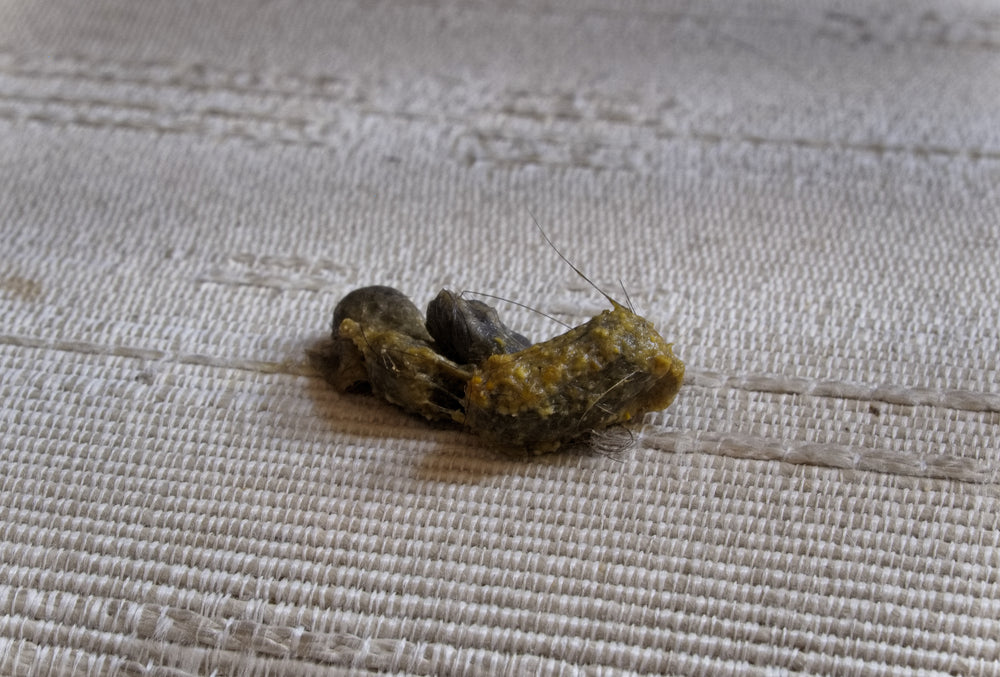
No.
The best way to prevent hairballs is to prevent your cat from swallowing too much hair. And the best way to do that is with regular grooming.
Hairball products, like Laxatone, are typically petroleum-based, meaning that they coat the hair, helping it slide on through the digestive tract. They aren’t digested.
Fish oil, by contrast, is absorbed by a cat’s body, which is exactly what you want it to do.
Read this post on cats and hairballs for more information.
Love Pinterest? Here's a Pinterest-friendly pin for your boards!
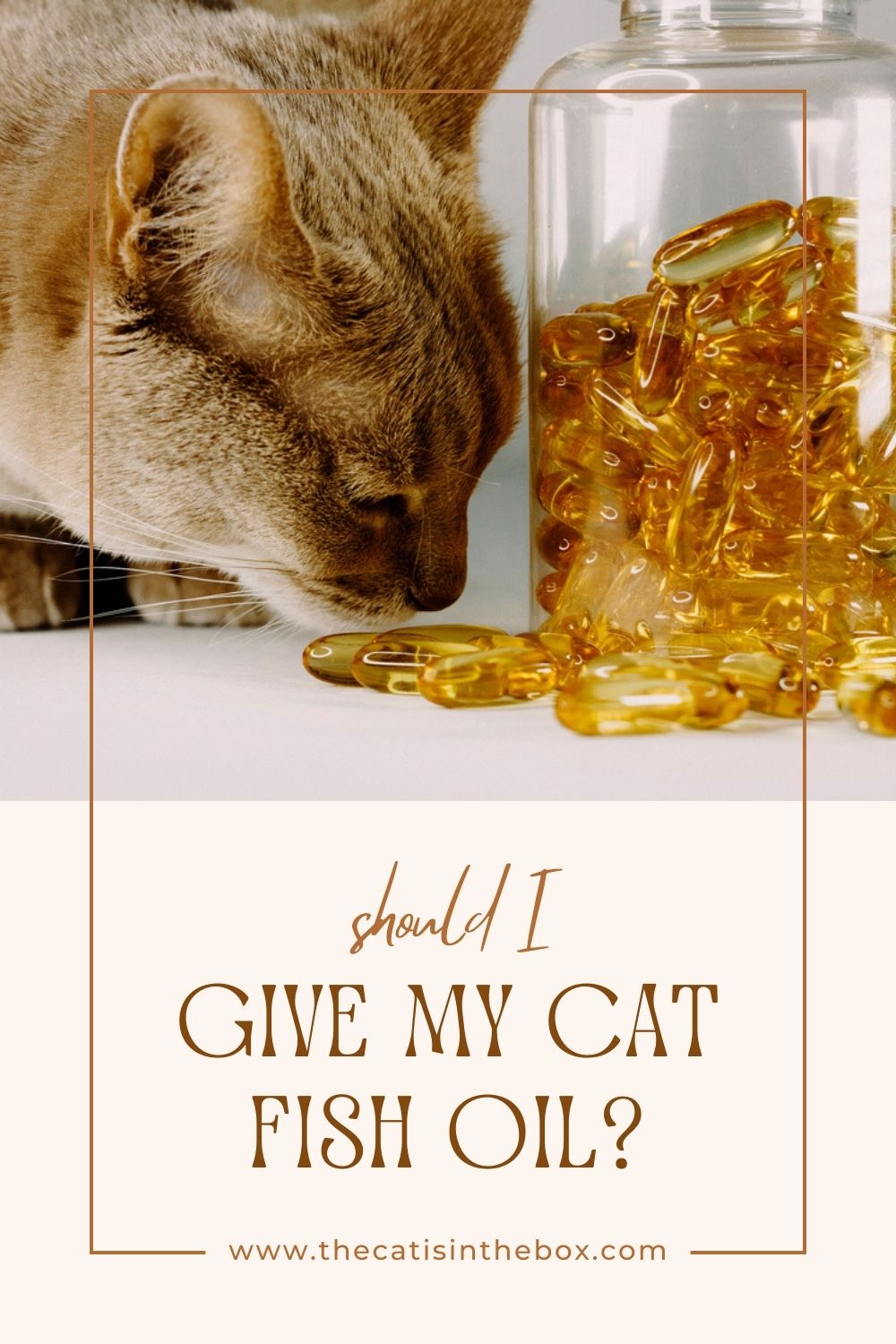
Dawn LaFontaine is a lifelong animal lover who always seems to have a little pet hair in her keyboard. Her blog, Kitty Contemplations, helps cat guardians better understand and care for the special beings they share their lives and homes with. Her cat-products business, Cat in the Box, sells beautiful, well-made, and award-winning products that she designed to meet the biological needs of cats.
_______________
FOOTNOTES
[1] Walle, Gavin Van De. “Polyunsaturated Fat: Definition, Foods, Benefits and Risks.” Healthline, Healthline Media, 12 July 2023, www.healthline.com/nutrition/polyunsaturated-fat.
[2] Hjalmarsdottir, Freydis. “The 3 Most Important Types of Omega-3 Fatty Acids.” Healthline, Healthline Media, 27 May 2019, www.healthline.com/nutrition/3-types-of-omega-3#_noHeaderPrefixedContent.
[3] ibid.
[4] “Omega Definition & Meaning.” Merriam-Webster, Merriam-Webster, www.merriam-webster.com/dictionary/omega. Accessed 18 Mar. 2024.
[5] Solomon, Dr. Donna. “Fish Oil for Dogs and Cats: Six Benefits.” Animal Medical Center of Chicago, 15 Aug. 2018, www.animalmedicalcenterofchicago.com/fish-oil-for-dogs-and-cats-six-benefits/.
[6] “Omega-3 Fatty Acids: An Essential Contribution.” The Nutrition Source, 14 Sept. 2023, www.hsph.harvard.edu/nutritionsource/what-should-you-eat/fats-and-cholesterol/types-of-fat/omega-3-fats/.
[7] “Alpha-Linolenic Acid.” Mount Sinai Health System, www.mountsinai.org/health-library/supplement/alpha-linolenic-acid. Accessed 18 Mar. 2024.
[8] Heinze, Cailin R. “The Skinny on Fat: Part 2 – Essential Fatty Acids and Inflammation.” Clinical Nutrition Service at Cummings School, 16 Mar. 2022, vetnutrition.tufts.edu/2018/04/essential-fatty-acids-and-inflammation/.
[9] “Fish Oil.” Mayo Clinic, Mayo Foundation for Medical Education and Research, 10 Aug. 2023, www.mayoclinic.org/drugs-supplements-fish-oil/art-20364810.
[10] “Fish Oil: Overview, Uses, Side Effects, Precautions, Interactions, Dosing and Reviews.” WebMD, WebMD, www.webmd.com/vitamins/ai/ingredientmono-993/fish-oil. Accessed 14 Mar. 2024.
[11] “11 Important Benefits of Fish Oil, Based on Science.” Healthline, Healthline Media, www.healthline.com/nutrition/benefits-of-fish-oil#nutritional-info. Accessed 14 Mar. 2024.
[12] Hjalmarsdottir, Freydis. “The 3 Most Important Types of Omega-3 Fatty Acids.” Healthline, Healthline Media, 27 May 2019, www.healthline.com/nutrition/3-types-of-omega-3#_noHeaderPrefixedContent.
[13] Cathy Barnette, DVM. “The Benefits of Fish Oil for Cats.” Pet Care Blog – Dog and Cat Health Advice and More | Healthy Paws, 23 May 2022, blog.healthypawspetinsurance.com/benefits-fish-oil-cats.
[14] “Fish Oil Recipe & Nutrition - Precision Nutrition’s Encyclopedia of Food.” Precision Nutrition, 4 July 2019, www.precisionnutrition.com/encyclopedia/food/fish-oil.
[15] Bonilla-Méndez, Jeimmy Rocío, and José Luis Hoyos-Concha. “Methods of Extraction, Refining and Concentration of Fish Oil as a Source of Omega-3 Fatty Acids.” Corpoica. Ciencia y Tecnología Agropecuaria, www.redalyc.org/journal/4499/449956975010/html/. Accessed 14 Mar. 2024.
[16] Yi M, You Y, Zhang Y, Wu G, Karrar E, Zhang L, Zhang H, Jin Q, Wang X. Highly Valuable Fish Oil: Formation Process, Enrichment, Subsequent Utilization, and Storage of Eicosapentaenoic Acid Ethyl Esters. Molecules. 2023 Jan 9;28(2):672. doi: 10.3390/molecules28020672. PMID: 36677730; PMCID: PMC9865908. https://www.ncbi.nlm.nih.gov/pmc/articles/PMC9865908/
[17] Bonilla-Méndez, Jeimmy Rocío, and José Luis Hoyos-Concha. “Methods of Extraction, Refining and Concentration of Fish Oil as a Source of Omega-3 Fatty Acids.” Corpoica. Ciencia y Tecnología Agropecuaria, www.redalyc.org/journal/4499/449956975010/html/. Accessed 14 Mar. 2024.
[18] Integricare. “Guide on Fish Oil for Cats [Benefits, Types, VET-Recommended Brands].” Blog, COMPANYNAME, 19 June 2023, resources.integricare.ca/blog/fish-oil-for-cats.
[19] ibid.
[20] “Fish Oil for Dogs & Cats: Dosage and Health Benefits.” Nordic Naturals, www.nordic.com/healthy-science/fish-oil-for-dogs-and-cats/. Accessed 19 Mar. 2024.
[21] “Fish Oil: VCA Animal Hospital: VCA Animal Hospitals.” Vca, vcahospitals.com/know-your-pet/fish-oil. Accessed 15 Mar. 2024.
[22] Solomon, Dr. Donna. “Fish Oil for Dogs and Cats: Six Benefits.” Animal Medical Center of Chicago, 15 Aug. 2018, www.animalmedicalcenterofchicago.com/fish-oil-for-dogs-and-cats-six-benefits/.
[23] “Should I Use Fish Oil for Cats?” Paramount Pet Health, Paramount Pet Health, 28 Aug. 2023, www.paramountpethealth.com/blogs/articles/should-i-use-fish-oil-for-cats.
[24] Pan Y, Araujo JA, Burrows J, et al. Cognitive enhancement in middle-aged and old cats with dietary supplementation with a nutrient blend containing fish oil, B vitamins, antioxidants and arginine. British Journal of Nutrition. 2013;110(1):40-49. doi:10.1017/S0007114512004771. https://www.cambridge.org/core/journals/british-journal-of-nutrition/article/cognitive-enhancement-in-middleaged-and-old-cats-with-dietary-supplementation-with-a-nutrient-blend-containing-fish-oil-b-vitamins-antioxidants-and-arginine/8FBEA082FB6AF1D95215F
[25] ibid
[26] Shipstone, Michael. “Hormonal Treatment for Integumentary Disease in Animals - Pharmacology.” Merck Veterinary Manual, Merck Veterinary Manual, 29 Feb. 2024, www.merckvetmanual.com/pharmacology/systemic-pharmacotherapeutics-of-the-integumentary-system/hormonal-treatment-for-integumentary-disease-in-animals.
[27] Solomon, Dr. Donna. “Fish Oil for Dogs and Cats: Six Benefits.”.
[28] Deborah E. Linder, DVM. “Should I Give Fish Oil to My Pet?” Clinical Nutrition Service at Cummings School, 25 Oct. 2018, vetnutrition.tufts.edu/2018/06/should-i-give-fish-oil-to-my-pet/.
[29] Solomon, Dr. Donna. “Fish Oil for Dogs and Cats: Six Benefits.”.
[30] “Omega-3 Fatty Acids and Arthritis in Cats.” PetMD, www.petmd.com/blogs/thedailyvet/ktudor/2013/jan/omega-3-fatty-acids-fish-oils-and-arthritis-in-cats-29779. Accessed 15 Mar. 2024.
[31] Solomon, Dr. Donna. “Fish Oil for Dogs and Cats: Six Benefits.”
[32] “Should I Use Fish Oil for Cats?” Paramount Pet Health, Paramount Pet Health, 28 Aug. 2023, www.paramountpethealth.com/blogs/articles/should-i-use-fish-oil-for-cats.
[33] “Omega-3 Fatty Acids and Arthritis in Cats.” PetMD, www.petmd.com/blogs/thedailyvet/ktudor/2013/jan/omega-3-fatty-acids-fish-oils-and-arthritis-in-cats-29779. Accessed 15 Mar. 2024.
[34] Corbee RJ, Barnier MM, van de Lest CH, Hazewinkel HA. The effect of dietary long-chain omega-3 fatty acid supplementation on owner's perception of behaviour and locomotion in cats with naturally occurring osteoarthritis. J Anim Physiol Anim Nutr (Berl). 2013 Oct;97(5):846-53. doi: 10.1111/j.1439-0396.2012.01329.x. Epub 2012 Aug 11. PMID: 22882740. https://pubmed.ncbi.nlm.nih.gov/22882740/
[35] “Should I Use Fish Oil for Cats?” Paramount Pet Health.
[36] “Cancer Nutrition: Evidence-Based Approaches (Proceedings).” DVM 360, www.dvm360.com/view/cancer-nutrition-evidence-based-approaches-proceedings. Accessed 18 Mar. 2024.
[37] Rutherfurd-Markwick KJ, Hendriks WH, Morel PC, Thomas DG. The potential for enhancement of immunity in cats by dietary supplementation. Vet Immunol Immunopathol. 2013 Apr 15;152(3-4):333-40. doi: 10.1016/j.vetimm.2013.01.007. Epub 2013 Jan 21. PMID: 23385006. https://pubmed.ncbi.nlm.nih.gov/23385006/
[38] “Fish Oil: VCA Animal Hospital: VCA Animal Hospitals.” Vca, vcahospitals.com/know-your-pet/fish-oil. Accessed 15 Mar. 2024.
[39] Ritter JC, Budge SM, Jovica F. Quality analysis of commercial fish oil preparations. J Sci Food Agric. 2013 Jun;93(8):1935-9. doi: 10.1002/jsfa.5994. Epub 2012 Dec 17. PMID: 23255124. https://pubmed.ncbi.nlm.nih.gov/23255124/
[40] Integricare. “Guide on Fish Oil for Cats [Benefits, Types, VET-Recommended Brands].”
[41] “Wild Caught vs. Farm Raised Seafood.” College of Health and Human Sciences, 27 Feb. 2020, chhs.source.colostate.edu/wild-caught-vs-farm-raised-seafood/.
[42] Solomon, Dr. Donna. “Fish Oil for Dogs and Cats: Six Benefits.”
[43] “Triglyceride Form.” Absorption of Fish Oil, Nordic Naturals, www.nordicnaturals.com/images/supportMaterials/PDFs/TriglycerideForm.pdf. Accessed 20 Mar. 2024.
[44] Kutty, Vin. “Molecularly Distilled Fish Oil.” OmegaVia, 17 Sept. 2019, omegavia.com/molecularly-distilled-fish-oil/.
[45] Integricare. “Guide on Fish Oil for Cats [Benefits, Types, VET-Recommended Brands].”
[46] “Fish Oil: VCA Animal Hospital: VCA Animal Hospitals.”
[47] ibid.
[48] Cathy Barnette, DVM. “The Benefits of Fish Oil for Cats.”
[49] “Fish Oil: VCA Animal Hospital: VCA Animal Hospitals.”
[50] “Revealed: Many Common Omega-3 Fish Oil Supplements Are ‘Rancid.’” The Guardian, Guardian News and Media, 17 Jan. 2022, www.theguardian.com/environment/2022/jan/17/revealed-many-common-omega-3-fish-oil-supplements-are-rancid.
[51] Cathy Barnette, DVM. “The Benefits of Fish Oil for Cats.”
[52] “Vitamin A Poisoning in Cats: VCA Animal Hospitals.” Vca, vcahospitals.com/know-your-pet/vitamin-a-toxicosis-in-cats. Accessed 20 Mar. 2024.
[53] “Vitamin D Poisoning in Cats: VCA Animal Hospitals.”
[54] Solomon, Dr. Donna. “Fish Oil for Dogs and Cats: Six Benefits.”
[55] Vuorinen A, Bailey-Hall E, Karagiannis A, Yu S, Roos F, Sylvester E, Wilson J, Dahms I. Safety of Algal Oil Containing EPA and DHA in cats during gestation, lactation and growth. J Anim Physiol Anim Nutr (Berl). 2020 Sep;104(5):1509-1523. doi: 10.1111/jpn.13324. Epub 2020 Feb 18. PMID: 32072702; PMCID: PMC7540550. https://pubmed.ncbi.nlm.nih.gov/32072702/
[56] Heinze, Cailin R. “Human Grade: Should Pets Eat the Same Food That We Do?” Clinical Nutrition Service at Cummings School, 16 Mar. 2022, vetnutrition.tufts.edu/2019/02/human-grade/?_ga=2.30134397.395729341.1711034530-1204458673.1711034530.

